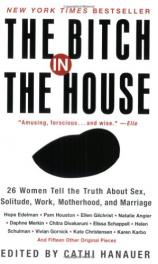Reading Group Guide
Discussion Questions
The Bitch in the House: 26 Women Tell the Truth About Sex, Solitude, Work, Motherhood, and Marriage

1. In "Excuse Me While I Explode," E.S. Maduro (not her real name) describes an ongoing dilemma: "Almost as if to entitle my anger, to justify or even fuel a frustration that's already there, I will -- for now, at least -- refuse any help from anyone, then bask in the fury of having too much to do and no time for myself." Can you relate to Maduro's problem? Do you find yourself exasperated by the stresses and responsibilities of your everyday life, and yet at the same time, proud of what you are capable of accomplishing on your own?
2.Daphne Merkin, in "Memoirs of an Ex-Bride" describes possible byproducts of marriage as "the loss of identity, the potential claustrophobia, the feeling of being utterly trapped." Can you identify with these feelings in any way? Do you think that they're exclusive to a marital relationship? How do they compare to your own experiences?
3. In her essay, "A Man in the Heart," Hazel McClay (not her real name) describes a level of emotional intimacy with her partner that is not matched by an equal level of sexual passion: "[G]reat married sex rarely seems to involve the romance-novel stuff -- the quivering, the melting, the physical passion." Were you surprised by how forthright the authors in this anthology were about their waxing and waning sex drives? Did you find any of their accounts of sexual passion resonated with your own experiences?
4. "The problem is that the marital negotiation, by its very nature, can suck the passion and mystery out of any relationship." Do you agree with this statement by Cynthia Kling? Does familiarity necessarily breed contempt or dispassion in love? Have you found ways of making your romantic relationships "new"?
5. In "Daddy Dearest," Laurie Abraham discusses her young daughter, Edie: "There is no one in my life whom I've ever been so grateful to escape and so grateful to see -- moment to moment, day in, day out." Does this reflect your experience (or the experiences of those you know) as a parent? Could the same statement be made of a lover, a spouse, or a family member, or is this phenomenon unique to parental love? Did Abraham's account of competition with her husband for Edie's affections strike you as unusual?
6. Did you envy or abhor any of the disparate paths chosen by any of the women in this anthology? Did any of the essays in The Bitch in the House make you laugh, or enable you to see yourself more clearly? Which ones?
7. Jill Bialosky writes in "How We Became Strangers": "I knew that my imagination and longings were central to leading an authentic life." How would you describe an authentic life? Are you living your life in a manner that allows you to be true to your beliefs and your passions? What, if anything, would you change about your life if you could?
8. In her essay, "The Middle Way," Ellen Gilchrist writes: "Family and work. I can let them be at war, with guilt as their nuclear weapon and mutually assured destruction as their aim, or I can let them nourish each other." Do you think that family and work are diametrically opposed in the grand scheme of life? Have you found a way that enables these aspects of your life to "nourish each other"?
9. Was the substance of The Bitch in the House what you were expecting? Was there any subject addressed that you were surprised to see in this book? Was there any topic not explored that you would have liked to see included?
The Bitch in the House: 26 Women Tell the Truth About Sex, Solitude, Work, Motherhood, and Marriage
- Publication Date: September 16, 2003
- Paperback: 304 pages
- Publisher: William Morrow Paperbacks
- ISBN-10: 0060936460
- ISBN-13: 9780060936464






